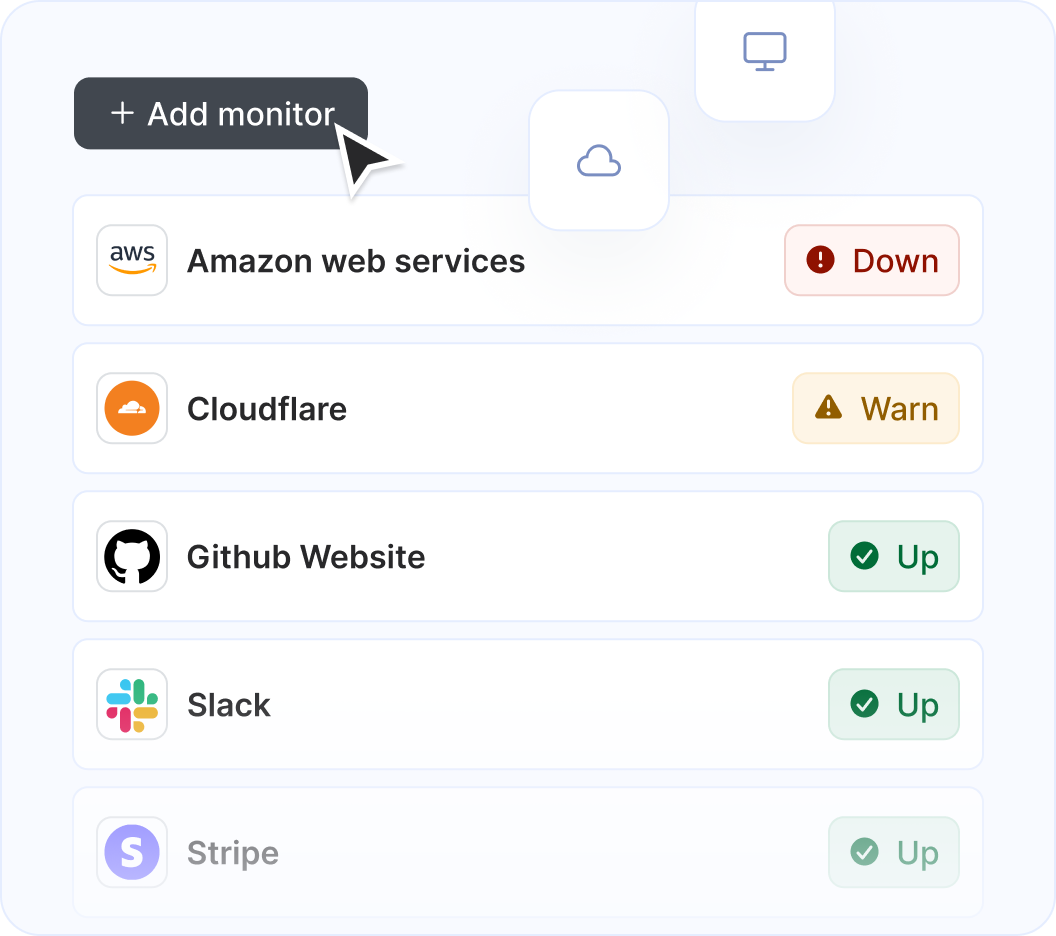2025: The year of the global cloud outage
Last checked from Cloud Run official status page 2 min. 47 sec. ago
Cloud computing services for business challenges by Google Cloud.
Not working for you?
StatusGator last checked the status of Google Cloud on and the service was operational. There have been 3 user-submitted reports of outages in the past 24 hours.
This chart represents Cloud Run service health over the last 24 hours, with data points collected every 15 minutes based on issue reports, page visits, and signal strength. Sign up for free to see more Cloud Run status data.
24 hrs ending
View and upvote the most commonly reported Cloud Run issues to help us better indicate the service status.
Have a different problem with Cloud Run?
See recent outage reports from real Cloud Run users
2 outage reports in the last 24 hours
Oregon, United States
Connectivity issue
about 2 hours ago
about 2 hours ago
South Carolina, United States
Slow performance
about 11 hours ago
about 11 hours ago
Explore our interactive Cloud Run outage map to monitor real-time incidents and service issues across the globe. This dynamic map highlights regions around the world affected by recent Google Cloud outages, giving you a clear view of performance and downtime trends.
Top reported Google Cloud outage locations, last 24 hours:
| Incident description | Duration | StatusGator detected | Officially acknowledged |
|---|---|---|---|
| BigQuery service outage | 34m |
Never acknowledged
|
|
| Gemini API and Vertex AI service outage | 1h 2m |
Never acknowledged
|
|
| Cloud Build jobs failing to start or stuck in queue | 19m |
Never acknowledged
|
|
| Locker Studio not loading | 2h 35m |
Never acknowledged
|
|
| Query results not displaying and error messages appearing | 38m |
Never acknowledged
|
|
| Looker Studio experiencing system errors and not loading charts | 1h 54m |
Never acknowledged
|
|
| Service connectivity and performance issues | 51m |
Never acknowledged
|
|
| Issues connecting to AppSheet. | 58m |
Never acknowledged
|
|
| Issues with Looker Studio dashboard loading and data retrieval | 5h 14m |
Never acknowledged
|
|
| Issues with app synchronization and accessing Google Drive tables | 1h 38m |
Never acknowledged
|

Follow the recent outages and downtime for Cloud Run in the table below. If you're experiencing a problem now, check the current Cloud Run status or
.| Incident Name | Duration | Started | Severity |
|---|---|---|---|
|
We are investigating elevated error rates with multiple products in us-east1
|
1m |
Warn
|
|
|
We are investigating elevated error rates with multiple products in us-east1
|
196d 8h 59m |
Warn
|
|
|
We are investigating elevated error rates with multiple products in us-east1
|
1m |
Warn
|
|
|
We are investigating elevated error rates with multiple products in us-east1
|
1h 25m |
Warn
|
|
|
Multiple GCP products are experiencing Service issues
|
1m |
Down
|
Stay updated with instant alerts for Cloud Run outages by signing up now!
You can also monitor any service or website on your status page

Stay updated with instant alerts for Cloud Run outages by signing up now!
With features designed to cover all your needs for monitoring and communicating outages or downtime, StatusGator keeps your team connected and informed. Stay updated on Cloud Run outages, potential problems, and its current status in real-time, ensuring you're always prepared to act.


StatusGator monitors over 7,150 cloud services, hosted applications, and websites. Just add what you need to the list, and we'll automatically aggregate their statuses into a single page. You'll receive notifications for any issues affecting you and your page subscribers.

StatusGator monitors all of your services and websites and sends your team instant notifications when they go down. Stay abreast of issues that affect your team with notifications: in email, Slack, Teams, or wherever your team communicates.



Easily notify your end-users of outages using a customizable status page. Display cloud services or websites, as well as any custom monitors you add manually. Create multiple status pages tailored to different needs, customize them, and embed them for maximum effectiveness.
Cloud Run (Cloud computing services for business challenges by Google Cloud) is a a Cloud Infrastructure solution that StatusGator has been monitoring since August 2016. Over the past over 9 years, we have collected data on on more than 2,611 outages that affected Cloud Run users. When Cloud Run publishes downtime on their status page, they do so across 7,445 components and 70 groups using 3 different statuses: up, warn, and down which we use to provide granular uptime metrics and notifications.
If you're wondering, "Is Cloud Run down?", or need to know its current status, we've got you covered. Our platform tracks every reported outage, performance issue, and maintenance window to ensure you're informed. Whether Cloud Run is experiencing a problem now or has recently resolved one, our detailed history keeps you updated.
More than 2,700 StatusGator users monitor Cloud Run to get notified when it's down or has an outage. This makes it one of the most popular Cloud Infrastructure services monitored on our platform. We've sent more than 453,200 notifications to our users about Cloud Run incidents, providing transparency and peace of mind. You can get alerts by signing up for a free StatusGator account.
If we detect a potential Cloud Run outage or other issue before it was reported on the official status page we will send an Early Warning Signal notification to StatusGator subscribers. We can often detect issues before they are officially acknowledged by the provider, giving you a head start on resolving any potential problems.
If Cloud Run is having system outages or experiencing other critical issues, red down notifications appear on the status page. In most cases, it means that core functions are not working properly, or there is some other serious customer-impacting event underway.
Warn notifications are used when Cloud Run is undergoing a non-critical issue like minor service issues, performance degradation, non-core bugs, capacity issues, or problems affecting a small number of users.
Cloud Run does not post separate notifications for planned maintenance work so we are unable to send notifications when maintenance windows begin. If you need Cloud Run maintenance notifications, please email us.
When Cloud Run posts issues on their status page, we collect the main headline message and include that brief information or overview in notifications to StatusGator subscribers.
When Cloud Run has outages or other service-impacting events on their status page, we pull down the detailed informational updates and include them in notifications. These messages often include the current details about how the problem is being mitigated, or when the next update will occur.
Because Cloud Run has several components, each with their individual statuses, StatusGator can differentiate the status of each component in our notifications to you whenever a particular component is down. This means, you can filter your status page notifications based on the services, regions, or components you utilize. This is an essential feature for complex services with many components or services spread out across many regions.
Stay updated with instant alerts for Cloud Run outages by signing up now!
Can't find your question? Email us to arrange a time to discuss. We'd love to chat!